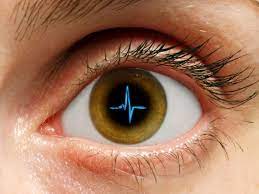
The eyes are often regarded as windows to the soul, but recent evidence suggests they can also provide insights into your heart’s health. Sudden changes in the blood vessels of the eye may serve as an early indicator of cardiovascular disease and potential stroke risk.
Understanding the Connection: Eyes and Heart Health
The arrangement of blood vessels in the back of the eye, known as retinal vasculature, is closely linked to heart health. During an eye examination, an ophthalmologist can use an ophthalmoscope to assess various aspects, including pupil reflexes, the eye’s lens, the retina, and the optic nerve. This examination can help predict conditions like hypertension, blocked arteries, diabetes, and arthritis.
Key Signs Revealed Through Eye Exams
- High Cholesterol Levels: The presence of yellow deposits around the eyes, known as xanthelasmas, may indicate high cholesterol levels, which pose risks to heart health. Xanthelasmas are painless, soft yellowish bumps and are more common in women. If you notice them, it’s advisable to have your cholesterol levels checked.
- Hypertension (High Blood Pressure): Red patches in the eyes can be indicative of high blood pressure or circulation problems. High blood pressure occurs when the force of blood against artery walls is too high. In the eyes, this can lead to a condition called retinopathy. Thick or narrow blood vessels or blockages in the eye’s blood vessels can signal potential heart problems.
- Diabetes: High blood sugar associated with diabetes can silently damage tiny blood vessels in the eyes. An eye test can detect this damage. Elevated blood sugar levels can lead to problems in the eye’s small blood vessels, potentially causing diabetic retinopathy and eventual blindness.
- Swollen Eyelids or Puffy Eyes: The presence of extra fluid leading to swollen eyelids or puffy eyes can indicate fluid buildup, a possible sign of heart problems. If a sudden loss of vision occurs and eye examination reveals a clot in retinal blood vessels, it may suggest underlying heart disease.
Early Detection for Better Heart Health
Our eyes can serve as a valuable tool for detecting heart-related issues. Unusual eye difficulties should not be ignored. Consulting a doctor and undergoing eye examinations can lead to the early detection of heart abnormalities, ultimately improving heart health. The eyes’ role in unveiling potential heart problems highlights the importance of regular eye check-ups in maintaining overall well-being.